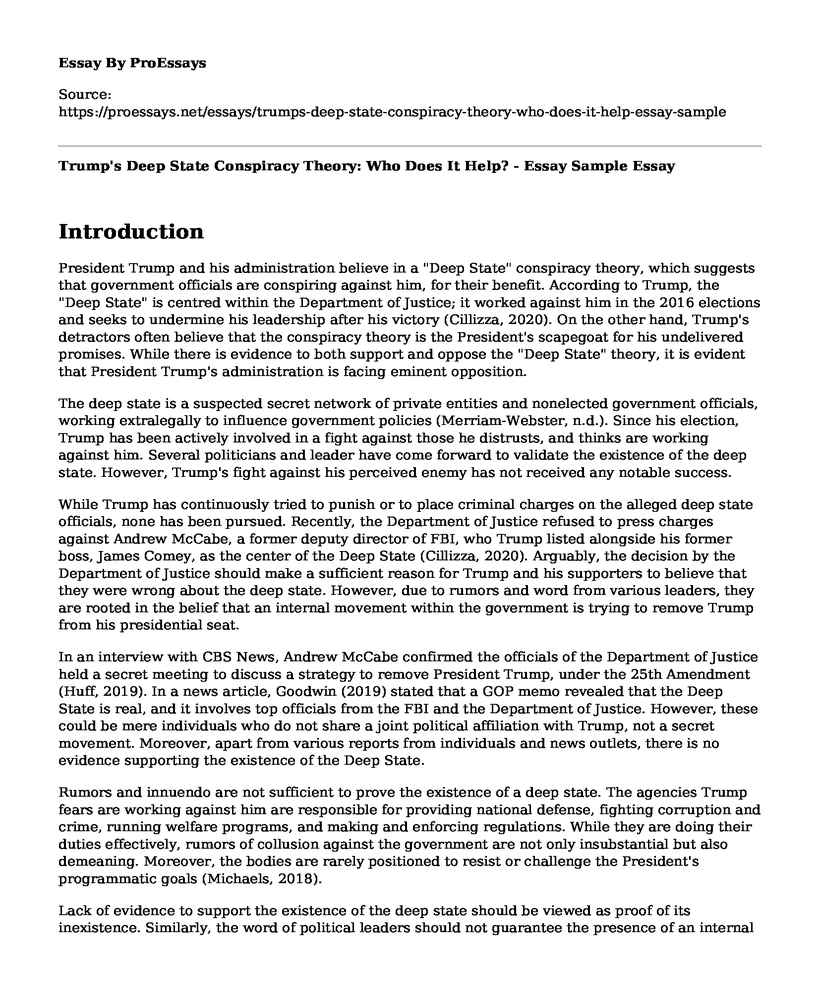Introduction
President Trump and his administration believe in a "Deep State" conspiracy theory, which suggests that government officials are conspiring against him, for their benefit. According to Trump, the "Deep State" is centred within the Department of Justice; it worked against him in the 2016 elections and seeks to undermine his leadership after his victory (Cillizza, 2020). On the other hand, Trump's detractors often believe that the conspiracy theory is the President's scapegoat for his undelivered promises. While there is evidence to both support and oppose the "Deep State" theory, it is evident that President Trump's administration is facing eminent opposition.
The deep state is a suspected secret network of private entities and nonelected government officials, working extralegally to influence government policies (Merriam-Webster, n.d.). Since his election, Trump has been actively involved in a fight against those he distrusts, and thinks are working against him. Several politicians and leader have come forward to validate the existence of the deep state. However, Trump's fight against his perceived enemy has not received any notable success.
While Trump has continuously tried to punish or to place criminal charges on the alleged deep state officials, none has been pursued. Recently, the Department of Justice refused to press charges against Andrew McCabe, a former deputy director of FBI, who Trump listed alongside his former boss, James Comey, as the center of the Deep State (Cillizza, 2020). Arguably, the decision by the Department of Justice should make a sufficient reason for Trump and his supporters to believe that they were wrong about the deep state. However, due to rumors and word from various leaders, they are rooted in the belief that an internal movement within the government is trying to remove Trump from his presidential seat.
In an interview with CBS News, Andrew McCabe confirmed the officials of the Department of Justice held a secret meeting to discuss a strategy to remove President Trump, under the 25th Amendment (Huff, 2019). In a news article, Goodwin (2019) stated that a GOP memo revealed that the Deep State is real, and it involves top officials from the FBI and the Department of Justice. However, these could be mere individuals who do not share a joint political affiliation with Trump, not a secret movement. Moreover, apart from various reports from individuals and news outlets, there is no evidence supporting the existence of the Deep State.
Rumors and innuendo are not sufficient to prove the existence of a deep state. The agencies Trump fears are working against him are responsible for providing national defense, fighting corruption and crime, running welfare programs, and making and enforcing regulations. While they are doing their duties effectively, rumors of collusion against the government are not only insubstantial but also demeaning. Moreover, the bodies are rarely positioned to resist or challenge the President's programmatic goals (Michaels, 2018).
Lack of evidence to support the existence of the deep state should be viewed as proof of its inexistence. Similarly, the word of political leaders should not guarantee the presence of an internal force within the government fighting the development of the nation. Trump's administration must acknowledge that every American did not vote for him, and he is likely to face opposition, which is not the primary reason why an aspect of his leadership is going wrong. Consequently, people should ignore the deep state theory, and correct the government hold the government accountable for each of its actions.
The existence of the deep state is debatable, but opposition against the Trump administration is apparent. While Trump has constantly tried to punish or to place criminal charges on the alleged deep state officials, none has been pursued. Andrew McCabe and a GPO memo allegedly affirmed the existence of the deep state; however, apart from related reports, there is no further supporting evidence. The lack of evidence and unsubstantiated rumors should be viewed as proof of its inexistence. However, the opposition is present, and the government should be held accountable for its actions.
References
Cillizza, C. (2020, February 14). Trump's 'Deep State' Conspiracy Theory Just Took a Big Hit. CNN. https://edition.cnn.com/2020/02/14/politics/andrew-mccabe-donald-trump-department-of-justice/index.html
Goodwin, M. (2018, May 11). The GOP Memo Proves the 'Deep State' is Real. New York Post. https://nypost.com/2018/02/03/the-gop-memo-proves-the-deep-state-is-real/
Huff, E. (2019, February 17). McCabe Confirms the Existence of a Rogue Deep State; No Apology from the Controlled Media for Mocking Those Who Warned About True Conspiracy. Deep State News. https://deepstate.news/2019-02-17-mccabe-confirms-the-existence-of-a-rogue-deep-state.html
Merriam-Webster. (n.d.). Definition of DEEP STATE. In Dictionary by Merriam-Webster: America's most-trusted online dictionary. https://www.merriam-webster.com/dictionary/deep%20state
Michaels, J. D. (2017). The American Deep State. Notre Dame L. Rev., 93, 1653. https://scholarship.law.nd.edu/ndlr/vol93/iss4/10
Cite this page
Trump's Deep State Conspiracy Theory: Who Does It Help? - Essay Sample. (2023, Apr 10). Retrieved from https://proessays.net/essays/trumps-deep-state-conspiracy-theory-who-does-it-help-essay-sample
If you are the original author of this essay and no longer wish to have it published on the ProEssays website, please click below to request its removal:
- Research Paper on Population Health Policy Analysis
- Sources for Accreditation in Primary Care - Paper Example
- Essay Sample on China, Taiwan, and the United States
- Torres and Aboriginal Strait Islander Community Child Wellbeing - Essay Sample
- Teachers Pay and Performance-Based Policies Essay Example
- Miracle Works Agency Client System Analysis Paper Example
- Essay on Democracy Alternatives: Exploring Communism, Capitalism & Government







